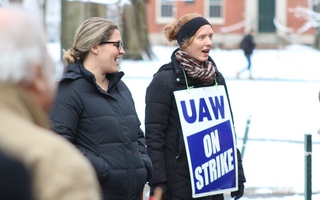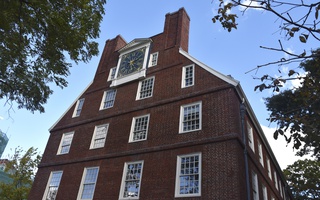{shortcode-e42fc392dee83961cb13bd77985d9e4d48d9363d}
Twenty four faculty members at the Harvard School of Public Health have signed onto a letter in support of negotiations between Harvard’s striking graduate student union and the University.
The letter — which is addressed to University President Lawrence S. Bacow, Provost Alan M. Garber ’76, and Director of Labor and Employee Relations Paul R. Curran — calls on Harvard to return “swiftly” to the bargaining table with Harvard Graduate Students Union-United Automobile Workers.
School of Public Health Professor Nancy Krieger, who signed the letter, wrote in an email that the professors first sent it Tuesday.
“There can be no bargaining in good faith if no bargaining sessions are scheduled,” the letter reads. “We support the right of HGSU-UAW to bargain in good faith for the interests of our graduate students, and we urge Harvard University to bargain in good faith in return.”
Since the letter's release, the University has scheduled a bargaining session with HGSU negotiators for Dec. 18 — though union organizers called the newly scheduled three-hour session “inadequate” in an email update sent to members Wednesday.
HGSU, which boasts roughly 4,000 members, represents graduate and undergraduate teaching staff and graduate research assistants across the University. The union began its strike Dec. 3 — 13 months into negotiations over its first contract — and will continue striking indefinitely.
School of Public Health Professor Marc Lipsitch, who also signed the letter, said he thought faculty who support their students’ efforts should see the grievances raised by the students as legitimate.
“Striking is just a complicated interaction with an academic environment,” Lipsitch said. “So I think a number of us would like to be as supportive as we can while still trying to keep education and research continuing.”
When asked why she signed the letter, Mary T. Bassett, who directs the Francois-Xavier Bagnoud Center for Health and Human Rights, referenced Article 23 of the United Nation’s Declaration of Human Rights, which grants the right to unionize.
“The graduate students, as workers, have exercised these rights and, of course, I support their right to do so,” Bassett wrote in an email . “The letter called for resumption of scheduled meetings and I am pleased that a face to face negotiation session between the union and the University has been scheduled for this coming week.”
University spokesperson Jonathan L. Swain pointed to the upcoming bargaining session when asked for comment.
So far, the two parties have agreed on 12 tentative contract provisions. But when negotiators meet at the Wednesday bargaining session, three key provisions will remain on the table: compensation, health benefits, and grievance procedures for sexual harassment and discrimination.
Krieger wrote in an email that it does not take a position on the specific issues that would be considered in negotiations.
“The letter takes no position on the specific issues for which additional bargaining needs to take place, as that was not the purpose of the letter, which was instead focused on the process needed for there to be bargaining in good faith,” Krieger wrote.
“As concerned faculty, we thought it important to urge the resumption of bargaining in good faith, because we care about our graduate students and our University, as we are part of our University, we teach and work with our graduate students, and we have a stake in the two sides coming to good terms as a result of mutual bargaining in good faith,” she added.
—Staff writer Michelle G. Kurilla can be reached at michelle.kurilla@thecrimson.com. Follow her on Twitter @MichelleKurilla.
Read more in University News
Harvard, Antigua and Barbuda Discuss Educational PartnershipRecommended Articles
-
 HGSU and University Have Yet to Meet for Bargaining Session Since Start of Strike
HGSU and University Have Yet to Meet for Bargaining Session Since Start of Strike -
 Khurana Says College Preparing For Strike Spilling Into Second Semester
Khurana Says College Preparing For Strike Spilling Into Second Semester -
 Harvard Scheduled First Bargaining Session with Grad Union A Week After Strike
Harvard Scheduled First Bargaining Session with Grad Union A Week After Strike -
 Experts Say Harvard Internal Email About Grad Union Strike May Violate Labor Law
Experts Say Harvard Internal Email About Grad Union Strike May Violate Labor Law













